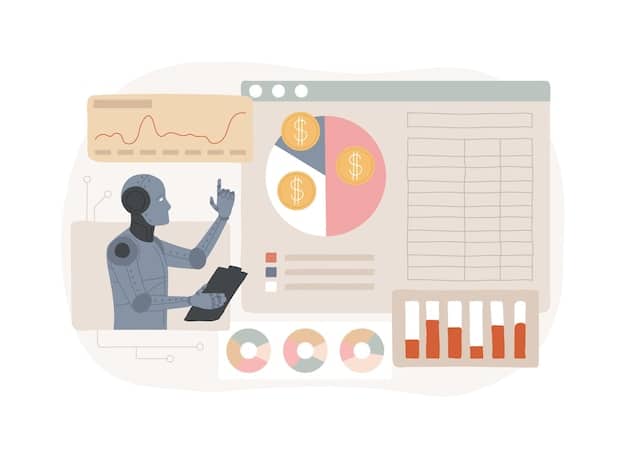Integrate AI into Task Management: A 2025 US Guide

Integrating AI into task management workflows in the US by 2025 can significantly enhance efficiency by automating routine tasks, improving decision-making through advanced analytics, and personalizing task management experiences for individuals and teams.
As we approach 2025, the integration of AI into various aspects of our lives becomes increasingly prevalent, and task management is no exception. This article explores how to integrate AI into your task management workflow in the US, 2025, offering practical insights and strategies to enhance productivity and efficiency.
Unveiling the AI-Powered Task Management Landscape
The integration of artificial intelligence into task management is no longer a futuristic concept but a rapidly evolving reality. In the US, businesses and individuals alike are recognizing the potential of AI to revolutionize how tasks are planned, executed, and monitored.
By 2025, AI-driven task management tools are expected to offer a range of sophisticated features, including predictive task prioritization, automated scheduling, and intelligent resource allocation. This section examines the key trends shaping the AI-powered task management landscape and highlights the benefits of adopting these technologies.
The Rise of Intelligent Task Assistants
One of the most significant developments in AI-powered task management is the emergence of intelligent task assistants. These virtual assistants leverage natural language processing (NLP) and machine learning (ML) to understand user commands, analyze task requirements, and provide proactive support.
Intelligent task assistants can automate routine tasks, such as scheduling meetings, sending reminders, and updating task statuses. They can also provide personalized recommendations based on user behavior and preferences, helping individuals and teams optimize their workflows.
Predictive Task Prioritization
Another key trend is the use of AI for predictive task prioritization. By analyzing historical data and identifying patterns, AI algorithms can predict which tasks are most likely to be delayed or require additional attention. This allows users to focus their efforts on the most critical tasks, improving overall productivity.
Predictive task prioritization can also help businesses identify potential bottlenecks in their workflows and take proactive measures to prevent delays. By optimizing resource allocation and streamlining task dependencies, AI can significantly enhance the efficiency of project management.

Key benefits of AI-powered task management include:
- Improved productivity and efficiency
- Reduced manual effort and errors
- Enhanced collaboration and communication
- Data-driven decision-making
In conclusion, the AI-powered task management landscape is rapidly evolving, offering a range of sophisticated features and benefits. By embracing these technologies, businesses and individuals can transform how they manage tasks, unlocking new levels of productivity and efficiency.
Identifying the Right AI Tools for Your Needs
With a growing number of AI-powered task management tools available in the market, it’s essential to identify the right solutions for your specific needs. This section provides a comprehensive guide to evaluating different AI tools and selecting those that align with your workflow and organizational goals.
Factors to consider when choosing an AI tool include its features, integration capabilities, ease of use, and cost. It’s also important to assess the vendor’s reputation and track record, as well as their commitment to ongoing support and updates.
Assessing Your Current Task Management Workflow
Before evaluating AI tools, it’s crucial to understand your current task management workflow and identify its strengths and weaknesses. This involves analyzing how tasks are currently planned, assigned, and tracked, as well as identifying any bottlenecks or inefficiencies.
By understanding your current workflow, you can determine which AI features are most likely to provide value. For example, if your team struggles with scheduling, an AI tool that offers automated scheduling may be a good fit. Similarly, if you need to improve task prioritization, an AI tool with predictive task prioritization capabilities may be beneficial.
Key Features to Look For
When evaluating AI-powered task management tools, it’s important to consider the following key features:
- Natural language processing (NLP) for understanding user commands
- Machine learning (ML) for predictive task prioritization
- Automated scheduling and reminders
- Intelligent resource allocation
- Collaboration and communication tools
Additionally, consider whether the tool offers integrations with other applications you use, such as email, calendar, and project management software. Integration can streamline your workflow and reduce the need to switch between different applications.
Popular AI-Powered Task Management Tools
Some of the popular AI-powered task management tools available in the US market include:
- Asana
- Trello
- Monday.com
- Microsoft To Do
Each of these tools offers a range of AI-powered features, such as automated task assignment, predictive task prioritization, and intelligent scheduling. It’s important to evaluate each tool based on your specific needs and requirements.
In summary, identifying the right AI tools for your needs involves assessing your current task management workflow, understanding the key features to look for, and evaluating different AI-powered solutions. By taking a strategic approach, you can select the tools that will provide the most value and help you achieve your organizational goals.
Streamlining Task Scheduling with AI Assistance
One of the most impactful ways to integrate AI into your task management workflow is by leveraging AI assistance for task scheduling. This section explores how AI can automate and optimize the scheduling process, saving time and improving overall efficiency.
AI-powered scheduling tools can analyze task dependencies, resource availability, and user preferences to create optimal schedules. They can also automatically adjust schedules in response to changing circumstances, such as unexpected delays or urgent tasks.
Automated Meeting Scheduling
Automated meeting scheduling is a key feature of many AI-powered task management tools. These tools can analyze the schedules of multiple participants and identify available time slots that work for everyone. They can also automatically send meeting invitations and reminders, reducing the administrative burden on individuals and teams.
Automated meeting scheduling can significantly improve the efficiency of scheduling meetings, especially for large groups. By eliminating the need for manual coordination and back-and-forth communication, AI can save time and reduce the risk of errors.
Intelligent Time Blocking
Intelligent time blocking is another valuable feature of AI-powered scheduling tools. Time blocking involves allocating specific blocks of time to different tasks or activities. AI can analyze your schedule and identify optimal time blocks for different tasks, taking into account factors such as your energy levels and task dependencies.
Intelligent time blocking can help you stay focused and avoid distractions. By scheduling specific time blocks for different tasks, you can create a structured and predictable workflow, improving your overall productivity.

AI-powered task scheduling can also help businesses optimize resource allocation. By analyzing the schedules of different employees, AI can identify those who are best suited to perform specific tasks. This can improve the efficiency of project management and ensure that resources are used effectively.
Integrating AI into your task scheduling process can transform how you manage your time and resources. By automating routine scheduling tasks and optimizing your workflow, AI can help you achieve new levels of productivity and efficiency.
Enhancing Collaboration with AI-Driven Tools
Collaboration is a critical aspect of effective task management, and AI can play a significant role in enhancing teamwork and communication. This section explores how AI-driven tools can improve collaboration and streamline workflows for teams working on complex projects.
AI-powered collaboration tools can facilitate real-time communication, automate task assignments, and provide intelligent insights to team members. They can also help identify potential conflicts and facilitate conflict resolution.
Real-time Communication and Collaboration
Real-time communication and collaboration are essential for effective teamwork. AI-powered tools can facilitate real-time communication through features such as instant messaging, video conferencing, and shared document editing.
These tools can also provide intelligent assistance in real-time. For example, they can automatically translate messages into different languages, summarize key points from discussions, and provide recommendations for relevant resources.
Automated Task Assignment and Tracking
Automated task assignment and tracking is another key feature of AI-driven collaboration tools. These tools can automatically assign tasks to team members based on their skills, availability, and workload. They can also track the progress of tasks and provide real-time updates to team members.
Automated task assignment and tracking can significantly improve the efficiency of project management. By eliminating the need for manual task assignment and tracking, AI can save time and reduce the risk of errors.
Intelligent Insights and Recommendations
AI-powered collaboration tools can also provide intelligent insights and recommendations to team members. For example, they can identify potential risks or delays in a project and provide recommendations for mitigating them. They can also recommend relevant resources and experts to team members based on their current tasks and challenges.
AI-driven collaboration tools can transform how teams work together. By facilitating real-time communication, automating task assignments, and providing intelligent insights, AI can help teams achieve new levels of productivity and success.
Future-Proofing Your Task Management with AI in the US
As we look towards the future, the integration of AI into task management is expected to become even more pervasive and sophisticated. This section explores the emerging trends and technologies that will shape the future of AI-powered task management in the US.
One of the key trends is the increasing use of AI for personalized task management. AI algorithms will become even better at understanding individual user preferences and behaviors, allowing them to provide highly customized task management experiences.
Personalized Task Management
Personalized task management involves tailoring task management tools and workflows to the specific needs and preferences of individual users. AI can analyze user behavior, such as task completion rates, time spent on different tasks, and preferred communication styles, to create personalized task management experiences.
Personalized task management can significantly improve user engagement and satisfaction. By providing tailored recommendations and features, AI can help users stay focused, motivated, and productive.
Predictive Analytics for Task Optimization
Predictive analytics is another key trend in the future of AI-powered task management. AI algorithms will become even better at predicting potential risks and delays in projects, allowing businesses to take proactive measures to prevent them.
Predictive analytics can also be used to optimize resource allocation and task prioritization. By analyzing historical data and identifying patterns, AI can help businesses make data-driven decisions about how to allocate resources and prioritize tasks.
Ethical Considerations and Data Privacy
As AI becomes more integrated into task management, it’s important to consider the ethical implications and data privacy concerns. Businesses must ensure that AI algorithms are used fairly and transparently, and that user data is protected from unauthorized access.
Ethical considerations and data privacy will become increasingly important in the future. By addressing these concerns proactively, businesses can build trust with their users and ensure that AI is used responsibly.
Future-proofing your task management with AI involves embracing emerging trends and technologies, such as personalized task management and predictive analytics. It also requires addressing ethical considerations and data privacy concerns. By taking a proactive approach, businesses can ensure that they are well-positioned to thrive in the age of AI.
Overcoming Challenges in AI Task Management Integration
While the benefits of integrating AI into task management are significant, there are also challenges that businesses must overcome to ensure a successful implementation. This section addresses some of the common challenges and provides strategies for mitigating them.
One of the common challenges is resistance to change. Employees may be hesitant to adopt new AI-powered tools and workflows, especially if they are accustomed to traditional task management methods.
Resistance to Change
Resistance to change is a natural reaction to new technologies and processes. To overcome this challenge, businesses must communicate the benefits of AI to employees and provide them with adequate training and support.
It’s also important to involve employees in the implementation process. By seeking their input and addressing their concerns, businesses can build buy-in and increase the likelihood of a successful implementation.
Data Integration and Quality
Data integration and quality is another key challenge. AI algorithms rely on data to make accurate predictions and recommendations. If the data is incomplete, inaccurate, or inconsistent, the AI may produce unreliable results.
To address this challenge, businesses must ensure that their data is properly integrated and that data quality is carefully monitored and maintained. This may involve investing in new data management tools and processes.
Cost and ROI
Cost and ROI are also important considerations. AI-powered task management tools can be expensive to implement and maintain. Businesses must carefully evaluate the costs and benefits of different AI solutions to ensure that they are getting a good return on their investment.
Overcoming challenges in AI task management integration requires a strategic approach. By addressing resistance to change, ensuring data integration and quality, and carefully evaluating costs and ROI, businesses can maximize the benefits of AI and achieve a successful implementation.
| Key Point | Brief Description |
|---|---|
| 🚀 AI Task Assistants | Automate routines, offer personalized recommendations. |
| 🎯 Predictive Priority | AI predicts critical tasks, prevents delays. |
| 📅 AI Scheduling | Automated meetings, intelligent time blocking. |
| 🤝 Enhanced Collaboration | AI facilitates real-time communication, task tracking. |
Frequently Asked Questions
▼
AI uses predictive analytics to assess task urgency and importance. It analyzes historical data, deadlines, and dependencies to highlight critical tasks, ensuring teams focus on what matters most for timely project completion.
▼
Privacy concerns include data security and transparency. Ensure your AI tools comply with data protection regulations like GDPR and CCPA. Regularly update privacy policies and conduct security audits to protect against data breaches.
▼
Tools like Asana, Trello, and Monday.com are popular for team collaboration. They offer features such as real-time updates, automated task assignments, and shared document editing to enhance teamwork and streamline workflows.
▼
Start by identifying integrations with your current tools. Look for AI plugins or APIs that can connect to existing platforms. Begin with small, automated tasks and gradually expand as you become more comfortable with the integration.
▼
AI is more likely to augment rather than replace human task managers. It automates routine tasks, provides insights, and optimizes processes, freeing human managers to focus on strategic decision-making, creative problem-solving, and team leadership.
Conclusion
Integrating AI into your task management workflow in the US by 2025 presents a transformative opportunity. By leveraging AI-powered tools, businesses and individuals can enhance productivity, streamline workflows, and achieve new levels of efficiency. As AI technology continues to evolve, staying informed and adapting to emerging trends will be essential for future-proofing your task management strategies.





